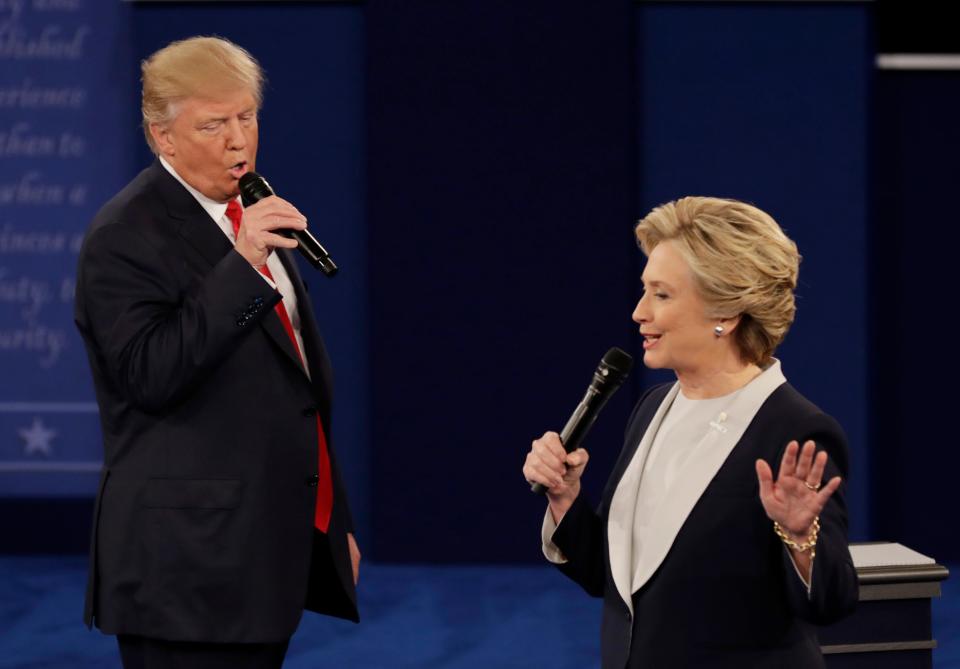Twitter user convicted for false voting information, not Hillary Clinton memes | Fact check
- Oops!Something went wrong.Please try again later.
The claim: Douglass Mackey was sentenced to prison for 'making memes disparaging Hillary Clinton'
An Oct. 18 Instagram post (direct link, archive link) includes a screenshot of a post on X, formerly Twitter, that claims a social media user is being imprisoned for political memes.
“BREAKING: Twitter user Douglass Mackey sentenced to 7 months in prison after being found guilty of election interference for making memes disparaging Hillary Clinton,” reads the post, which links to a Post Millenial story making the same claim.
It received more than 70,000 likes in two days. Another version of the post was shared on X by right-wing commentator Dinesh D’Souza and received nearly 1,300 shares.
Follow us on Facebook! Like our page to get updates throughout the day on our latest debunks
Our rating: False
Making memes disparaging political figures is not illegal. Mackey was sentenced for posting memes that encouraged Clinton supporters to vote via text message, which is not a valid way to vote.
Jury finds Mackey's posts went beyond political satire protected by First Amendment
Mackey, who had nearly 60,000 followers on X in 2016, was convicted of conspiracy against rights after posting false messages on social media encouraging supporters of 2016 Democratic presidential candidate Hillary Clinton to vote through text message, according to a press release from the U.S. Attorney's Office Eastern District of New York. Texting is not a valid way to submit a vote for a presidential election.
Around and on Election Day 2016, thousands of unique numbers texted "Hillary" to the number Mackey and his co-conspirators tweeted as a way to vote, according to the release.
Mackey was sentenced to seven months in prison on Oct. 18.
Eugene Volokh, a law professor at the University of California – Los Angeles, said the case didn’t arise because of Mackey’s political beliefs.
“He was prosecuted not for criticizing Hillary Clinton but for deliberately conveying false information about how one can vote for Hillary Clinton in a way the jury concluded was intended to try to keep people from going to the polling places,” Volokh said.
Multiple reputable news outlets also reported Mackey was convicted for a voter suppression scheme, not for making memes criticizing Clinton.
Fact check: Hillary Clinton has not been indicted, despite viral post to the contrary

Mackey's supporters, including former Fox News personality Tucker Carlson, have decried the trial as a criminalization of free speech, as reported by the New York Times. His defense team said it was "highly unlikely" anyone thought the memes were legitimate and that a ruling against Mackey could have a chilling effect on free speech, the outlet reported.
The Post Millennial, a Canadian conservative news website that published the article referenced in social media posts, provided no evidence that the prosecution stemmed from memes critiquing Clinton in an email exchange with USA TODAY. Editor-in-Chief Libby Emmons argued in the email that Mackey's posts should be considered jokes.
But the charges weren't about criticism, they were about inaccurate voting information.
And the jury ultimately decided that Mackey's memes went beyond political satire and intentionally sought to get people to vote using invalid methods, said Joe Tomain, a senior lecturer at Indiana University with expertise in free speech.
"I think it’s fair to say if you had people on the left who were doing the same kinds of things, the statute would apply to them too," Tomain said. "I don’t see this as a partisan issue."
Both Volokh and Tomain said the conviction used a broadly worded criminal statute that outlaws conspiracy to "injure, threaten or intimidate a person ... in the free exercise or enjoyment of any right or privilege secured by the Constitution or laws of the United States" – in this case, the right to vote.
Because the law itself does not specify what is protected speech regarding elections, Tomain said he sees the First Amendment concerns by Mackey's supporters as "legitimate." Volokh and Tomain said a more specifically written law on the topic of election-related speech could help curb concerns of the broader statute being used to silence political speech in the future.
USA TODAY has previously debunked an array of false and misleading claims from the Post Millenial, including claims that Boston Children’s Hospital was offering "gender-affirming hysterectomies" for young girls, that Rep. Alexandria Ocasio-Cortez faked being arrested while protesting at the Supreme Court and that the president of the European Commission called for getting rid of the Nuremberg Code.
USA TODAY reached out to users who shared the post for comment but did not immediately receive a response.
Our fact-check sources:
Joe Tomain, Oct. 20, Phone call with USA TODAY
Eugene Volokh, Oct. 19, Phone call with USA TODAY
U.S. Attorney’s Office, Oct. 18, Social Media Influencer Douglass Mackey Sentenced after Conviction for Election Interference in 2016 Presidential Race
U.S. Attorney's Office, March 31, Social Media Influencer Douglass Mackey Convicted of Election Interference in 2016 Presidential Race
The New York Times, March 20, Trial of 2016 Twitter Troll to Test Limits of Online Speech
Thank you for supporting our journalism. You can subscribe to our print edition, ad-free app or e-newspaper here.
Our fact-check work is supported in part by a grant from Facebook.
This article originally appeared on USA TODAY: Douglass Mackey sentenced for encouraging voting via text | Fact check

